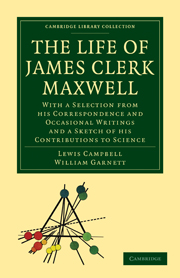 The Life of James Clerk Maxwell
The Life of James Clerk Maxwell Book contents
- Frontmatter
- PREFACE
- Contents
- LIST OF ILLUSTRATIONS
- PART I BIOGRAPHICAL OUTLINE
- CHAPTER I BIRTH AND PARENTAGE
- Note.—The Clerks of Penicuik and Maxwells of Middlebie
- CHAPTER II GLENLAIR—CHILDHOOD—1831-1841
- CHAPTER III BOYHOOD—1841-1844
- CHAPTER IV ADOLESCENCE—1844-1847
- Note.—Oval and Meloid
- CHAPTER V OPENING MANHOOD—1847-1850
- CHAPTER VI UNDERGRADUATE LIFE AT CAMBRIDGE—1850-1854
- CHAPTER VII BACHELOR-SCHOLAR AND FELLOW OF TRINITY—1854-1856
- CHAPTER VIII ESSAYS AT CAMBRIDGE—1853-1856
- CHAPTER IX DEATH OF HIS FATHER—PROFESSORSHIP AT ABERDEEN—1856-1857
- CHAPTER X ABERDEEN—MARRIAGE—1857-1860
- CHAPTER XI KING'S COLLEGE, LONDON—GLENLAIR—1860-1870
- CHAPTER XII CAMBRIDGE—1871-1879
- CHAPTER XIII ILLNESS AND DEATH—1879
- CHAPTER XIV LAST ESSAYS AT CAMBRIDGE
- PART II CONTRIBUTIONS TO SCIENCE
- PART III POEMS
- INDEX
- Plate section
CHAPTER XIV - LAST ESSAYS AT CAMBRIDGE
Published online by Cambridge University Press: 05 July 2011
- Frontmatter
- PREFACE
- Contents
- LIST OF ILLUSTRATIONS
- PART I BIOGRAPHICAL OUTLINE
- CHAPTER I BIRTH AND PARENTAGE
- Note.—The Clerks of Penicuik and Maxwells of Middlebie
- CHAPTER II GLENLAIR—CHILDHOOD—1831-1841
- CHAPTER III BOYHOOD—1841-1844
- CHAPTER IV ADOLESCENCE—1844-1847
- Note.—Oval and Meloid
- CHAPTER V OPENING MANHOOD—1847-1850
- CHAPTER VI UNDERGRADUATE LIFE AT CAMBRIDGE—1850-1854
- CHAPTER VII BACHELOR-SCHOLAR AND FELLOW OF TRINITY—1854-1856
- CHAPTER VIII ESSAYS AT CAMBRIDGE—1853-1856
- CHAPTER IX DEATH OF HIS FATHER—PROFESSORSHIP AT ABERDEEN—1856-1857
- CHAPTER X ABERDEEN—MARRIAGE—1857-1860
- CHAPTER XI KING'S COLLEGE, LONDON—GLENLAIR—1860-1870
- CHAPTER XII CAMBRIDGE—1871-1879
- CHAPTER XIII ILLNESS AND DEATH—1879
- CHAPTER XIV LAST ESSAYS AT CAMBRIDGE
- PART II CONTRIBUTIONS TO SCIENCE
- PART III POEMS
- INDEX
- Plate section
Summary
After Maxwell's return to Cambridge in 1871, several of those who had been “Apostles” together in 1853-7, revived the habit of meeting together for the discussion of speculative questions. This club of elder men (άνδρῶν πρεσβντέρων ἑταιρία), which included such men as Dr. Lightfoot, now Bishop of Durham, and Professors Hort and Westcott, was christened Erănus (see p. 366), and three of Maxwell's contributions, dated by himself, have been preserved. It seems advisable to print these entire,—although not even chips from his workshop, but rather sparks from the whetstone of his mind,—since what he thought worthy of detaining the attention of such listeners in those ripe years cannot fail to be of interest to many readers.
Does the progress of Physical Science tend to give any advantage to the opinion of Necessity (or Determinism) over that of the Contingency of Events and the Freedom of the Will?
11th February 1873
Æt 41.
The general character and tendency of human thought is a topic the interest of which is not confined to professional philosophers. Though every one of us must, each for himself, accept some sort of a philosophy, good or bad, and though the whole virtue of this philosophy depends on it being our own, yet none of us thinks it out entirely for himself.
- Type
- Chapter
- Information
- The Life of James Clerk MaxwellWith a Selection from his Correspondence and Occasional Writings and a Sketch of his Contributions to Science, pp. 434 - 464Publisher: Cambridge University PressPrint publication year: 2010First published in: 1882
- 1
- Cited by


